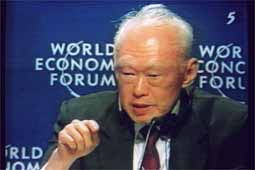
Our World Correspondents
Washington
Lee Siew Hua
Developing nations 'need help'

By CHUA LEE HOONG IN DAVOS
THE onus is on developed countries to help developing countries join the international financial system in such a way that the latter will not suffer shocks unknowingly, Senior Minister Lee Kuan Yew (above) said yesterday. When the World Bank, the International Monetary Fund and the G-7 countries invited countries like Indonesia, South Korea and Thailand to plug into the international economy, they had not warned them about the attendant risks, and thus, the latter got burnt.
Referring to Korean chaebols which went into the international money market as an example, he told a press conference here: "It was an accident waiting to happen, and it happened."
Europe and the United States had to play their part to curb financial instability. "Otherwise, over the next 10 to 15 years, the world will be a very precarious place."
He suggested that the US, Europe, and Japan could for a start help reduce volatility in the currency market by keeping the dollar, the euro and the yen under tighter rein, but noted ruefully that Federal Reserve chairman Alan Greenspan -- for whom he had a "great respect" -- did not seem to think currency target zones practical.
The present international financial system, he said, had evolved by "trial and error" since the lifting of the gold standard in 1971, and despite new financial instruments like derivatives and hedge funds since then, there was still a lack of regulation.
"Now their flaws are showing up," he noted, but said he did not foresee any quick solution.
International rules, he said, were not necessarily the answer, as these could not protect individual countries.
Taxes on capital flows, as suggested by many people since the currency crisis began, required a country to have achieved a certain level of sophistication in its banking system. In any case, as foreigners lent to the private sector, not governments, capital taxes were hard to enforce.
Thus there was a need for some countries to resort to "more intrusive laws".
Mr Lee alluded to the same points earlier at a plenary session with Canadian Prime Minister Jean Chretien, Polish President Aleksander Kwasniewski and Goldman Sachs co-chairman Jon Corzine.
The four agreed on the need for developed countries to do their share in averting financial turbulence.
Mr Corzine, referring to the need for more market transparency, said: "Developed countries should take the same medicine."
Mr Kwasniewski, who laid claim to having a "fresh perspective" on capitalism as his country's experiment with it was just 10 years old, said the developed (capitalist) world had a special responsibility to ensure it worked well, since the socialist alternative had collapsed with the Soviet Union.
Mr Chretien noted ruefully that the Canadian dollar had not been spared, and said: "We cannot blame only the Asian countries."
Following this session, American Vice-President Al Gore told the World Economic Forum that President Bill Clinton would announce significant new funding for highly-indebted countries in his Budget proposal to Congress on Monday.
